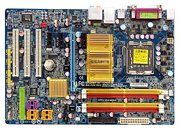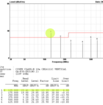zekrahminator
McLovin
- Joined
- Jan 29, 2006
- Messages
- 9,066 (1.30/day)
- Location
- My house.
| Processor | AMD Athlon 64 X2 4800+ Brisbane @ 2.8GHz (224x12.5, 1.425V) |
|---|---|
| Motherboard | Gigabyte sumthin-or-another, it's got an nForce 430 |
| Cooling | Dual 120mm case fans front/rear, Arctic Cooling Freezer 64 Pro, Zalman VF-900 on GPU |
| Memory | 2GB G.Skill DDR2 800 |
| Video Card(s) | Sapphire X850XT @ 580/600 |
| Storage | WD 160 GB SATA hard drive. |
| Display(s) | Hanns G 19" widescreen, 5ms response time, 1440x900 |
| Case | Thermaltake Soprano (black with side window). |
| Audio Device(s) | Soundblaster Live! 24 bit (paired with X-530 speakers). |
| Power Supply | ThermalTake 430W TR2 |
| Software | XP Home SP2, can't wait for Vista SP1. |
This is rather unfortunate, considering that the majority of our motherboards are made in Taiwan. DailyTech did some true journalism, and looked into the famed Gigabyte GA-P35-DS3. It seems that after a few months, the DS3's have their fair share of electronic noise, and some issues with reliability/interference. And so, an independent firm sent some DS3 samples to FCC labs to confirm that they indeed did comply with FCC regulations for Electro-Magnetic Interference. Electro-Magnetic Interference does a lot of things to our beloved technology, such as disrupt, obstruct or simply degrade them. Two out of three samples failed terribly. When the same samples were sent to a European lab to test for CE compliance, all of the boards failed. This means that the tens of thousands of motherboards currently in systems world-wide do not comply with FCC/CE regulations for EMI.


The larger problem is not that the consumer is getting a bad product: it's that most Taiwanese motherboard manufacturers are faking FCC/CE compliance. They simply stick an FCC logo on their motherboard so that it can sell in America/Europe. Even worse: if they are caught, there are rarely any repercussions. A Taiwanese motherboard engineer, who wished to remain anonymous, claims that EMI regulation compliance is, in general, faked across the industry. "If we claim to pass FCC and in actuality we do not, it's just a conscience problem. Some manufacturers put the FCC logo on their product even though they don't send in to any lab. If they are lucky, they go by. If they are unlucky, they get fined by the government or in some serious case, issue a product recall."
Conversations with other representatives reveal even in the instances of serious violation, vendors receive little official recourse.
View at TechPowerUp Main Site


The larger problem is not that the consumer is getting a bad product: it's that most Taiwanese motherboard manufacturers are faking FCC/CE compliance. They simply stick an FCC logo on their motherboard so that it can sell in America/Europe. Even worse: if they are caught, there are rarely any repercussions. A Taiwanese motherboard engineer, who wished to remain anonymous, claims that EMI regulation compliance is, in general, faked across the industry. "If we claim to pass FCC and in actuality we do not, it's just a conscience problem. Some manufacturers put the FCC logo on their product even though they don't send in to any lab. If they are lucky, they go by. If they are unlucky, they get fined by the government or in some serious case, issue a product recall."
Conversations with other representatives reveal even in the instances of serious violation, vendors receive little official recourse.
View at TechPowerUp Main Site
Last edited by a moderator:










 ) Time to pull out those tin hats again =)
) Time to pull out those tin hats again =)